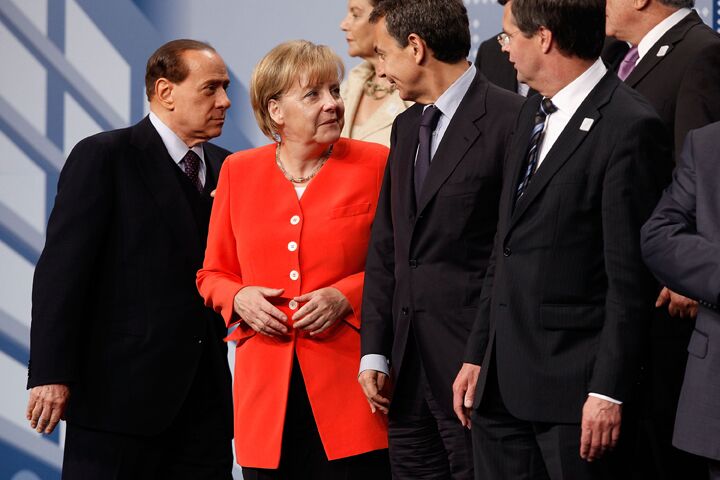
Germany’s Big Win at the G-20
Despite its $1 billion price tag, the G-20 summit was largely seen by pundits as at best a farce, at worst a failure. Reuters headlined “Do-little G-20 summit leaves markets unperturbed,” revealing little grasp of the impact of the reality that it reported further down in the article:
European leaders got what they saw as a green light to pursue austerity measures they consider essential to restore market confidence in the euro dented by the Greek fiscal crisis and wider concerns about high European sovereign debt.
”To be honest, it was more than I expected,” German Chancellor Angela Merkel said of the G-20’s non-binding pledge to halve budget deficits by 2013 and balance budgets from 2016. The United States had pressed the Europeans before the meeting to avoid withdrawing economic stimulus measures prematurely and urged countries with current account surpluses such as Germany to boost domestic demand. ”The positive outcome is that the European consolidation programs, which are moderate and appropriate given the confidence crisis in Europe, have been endorsed and accepted by others at the G-20 level,” Michael Heise, chief economist of Europe’s biggest insurer, Allianz, told Reuters.
Allianz is headquartered in Munich, Germany.
Europeans certainly got the point. The headline that Agence-France Presse ran in the wake of the G-20 meeting was much more upbeat, declaring, “Merkel Scores Victory at G-20 Summit.” Using a different style of verbiage to the Reuters report, afp mused that
Merkel … managed to seal a deal with the leaders of the world’s most industrialized countries to rein in public deficits—a key concern of Europe’s top economy.
G-20 leaders agreed to halve public debt by 2013, in a deal which Merkel had sought to put together over initial reluctance of the world’s top economy, the United States. ”It’s more than I expected that the industrialized nations have accepted this is a success,” a clearly pleased Merkel said. With flushed cheeks she stepped up to the podium for the traditional G-20 family photo, just hours after Germany’s World Cup victory and her own personal success at the summit talks.
Few commentators in North America really got the point—bullying tactics meant that Germany had got its way with the global economy days before world leaders even took off from their national capitals to attend this summit. In the process, they stole a march on a U.S. administration quite intent on continuing to pursue a patently failing policy of spending their economy out of recession.
The very best of intelligence and information on current events is seldom headlined. One has to retain sources that allow for digging deep behind the scenes to ascertain what is really going on in the world. Talking heads on television exist to gain a profit for their employer by peddling their particular editorial policy. The same goes largely for journalists who write the stories today that become the wrapping for fish and chips tomorrow.
Real news that has impact on your life today and your future tomorrow is that which gives one a vision of what current events really mean and where they are heading.
So, digging behind the facade of the recent G-20, one fact glaringly stands out before all else. The Toronto G-20 was more than just a ho-hum affair. The outcome, which the world, in particular the U.S., has yet to feel economically, was another huge win for the world’s leading national economy—Germany!
The Reuters article observed that
Analysts said the meager summit outcome raised doubts about the G-20’s value as a forum for managing the world economy.
”The G-20 is fragmented as it transitions out of its role as a crisis-fighting committee,” said Tom Bernes, vice president of the Center for International Governance Innovation in Toronto. ”While G-20 leaders agree on the need for stronger financial regulation, actual details continue to be vague and lacking a solid deadline …. There is a huge unfinished agenda.”
Dig behind the scenes and you would be quite surprised at how advanced that agenda is.
It really comes down to which nation is calling the tune today on the future direction of the global economy. From the G-8 to the G-20, from Europe’s central banking cabal to its Financial Stability Board, from Berlin to Berne, to Brussels and Rome, the Roman Catholic German elites of the finance industry are well advanced in achieving their dream of a resurrected Holy Roman Empire. An empire that, for its brief moment in time, will dominate global financial markets to the point of controlling the movement of goods, worldwide, to the detriment of the Anglo-Saxon peoples in particular (Revelation 13:16-17).
Read our booklet Who or What Is the Prophetic Beast? for a clearer understanding of this developing phenomenon.
